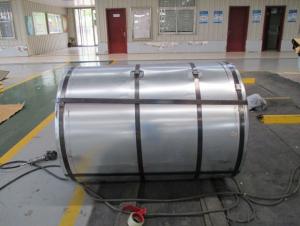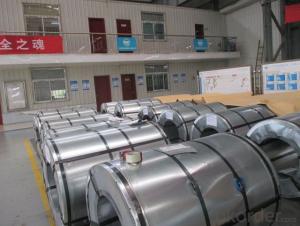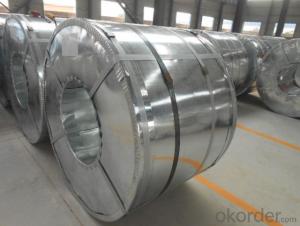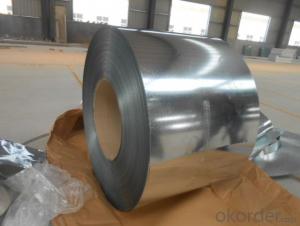STAINLESS STEEL COILS thickness 2.3mm
- Loading Port:
- China Main Port
- Payment Terms:
- TT OR LC
- Min Order Qty:
- -
- Supply Capability:
- -
OKorder Service Pledge
OKorder Financial Service
You Might Also Like
STAINLESS STEEL COILS
Packaging & Delivery
Packaging Detail: seaworthy export package
Delivery Detail: on request
Specifications
1. more than 10 years’ experience on this field
2. advanced equipments
3. competitive price
4. soonest delivery
Product Description :
Commodity
STAINLESS STEEL COILS
Technical Standard: Steel Grade &Standard:J1
Surface Treatment:NO.1
Hot rolled Annealed and Pickled(HRAP)
Grade: J1 , Prime quality
Mill Edge. No connection point in each coil.Component: Ni:1% , Cu: 0.65-0.9%, Cr: 13%, Mn: 10–12%, C: 0.09-0.12%
Package:Properly packed for ocean freight exportation in 20''container
Application::home appliances, constructions, building, machineries
Our Advantages :
1. Expertise:
More than 10 years of manufacture: we know how to properly handle every step of production.
2. Competitive price:
We can offer competitive prices to our customers.
3. Accuracy:
We have excellent technicians and leaders, which can ensure our products are exactly what you want.
4. Materials:
All steel coils are made of high-quality raw materials.
5. Certificate:
Our products are certified by ISO9001.
6. Productivity:
We have large-scales of production lines,, which can guarantee all your orders will be finished in earliest time.
The furnace heating style: improved Sendzimir heating technology
Hourly output: max.76.3t/h
Process after coating: tension leveling, Passivation or oiling
Our Service
Our quality
Test Equipments of Prepainted Galvanized Steel Coil : Salt-spray tester; Atomic absorption spectrophotometer; Rockwell typer hardness tester; Tensile test machine; Metrohm titration; Laboratory Bend test machine.
Our packing
Properly packed for ocean freight exportation in 20''container, galvanized metal fluted rings on inner and outer edges, galvanized metal & waterproof paper wall protection disk, galvanized metal & waterproof paper around circumference.
R&D department
R&D department concentrates on researching and developing reliable products with best quality. The quality department test and control every process of production to guarantee the best quality of product
- Q:How are steel coils used in the production of shipbuilding materials?
- Steel coils are used in shipbuilding materials as they provide a versatile and durable solution. They can be processed into various shapes and sizes, including plates, beams, and sections, which are essential components for constructing ships. The coils are often cut and shaped to fit specific design requirements, offering strength and structural integrity to the ship's framework. Additionally, the coils are utilized in the fabrication of various shipbuilding components, such as hulls, decks, bulkheads, and superstructures, ensuring the vessels' resilience and stability.
- Q:I'm in the process of buying a new car, and wondering if there are more benefits from Aluminum tire rims over Steel. Aluminum wheels cost more, but you'd think that steel would last longer. Are Aluminum wheels just for looks?
- aluminum is lighter , alot of performance cars use them to trim unsprung weight from the wheels ... steel wheels are cheaper but u have to put hub caps on them ... eeeeeuuuuueeewww!!!!!
- Q:Can steel coils be coated with anti-static materials?
- Yes, steel coils can be coated with anti-static materials. Anti-static coatings are often used to reduce or eliminate static electricity buildup on surfaces, including steel coils. These coatings help to prevent the accumulation of dust, reduce the risk of electrical discharge and sparks, and ensure the safe handling and storage of steel coils in various industries.
- Q:What are the different methods of coil flattening for steel coils?
- There are several methods used for coil flattening in the steel industry. Some of the common methods include roller leveling, tension leveling, and stretcher leveling. Roller leveling involves passing the coil through a series of rollers to flatten it. Tension leveling uses a combination of tension and bending to remove any shape defects in the coil. Stretcher leveling stretches the coil in the lengthwise direction to eliminate any waviness or buckling. Each method has its own advantages and is used based on the specific requirements of the steel coil.
- Q:How are steel coils measured for thickness?
- Steel coils are measured for thickness using a device called a micrometer or a thickness gauge. The micrometer is pressed against the coil's surface, and the measurement is displayed on its calibrated scale, providing an accurate reading of the steel coil's thickness.
- Q:How are steel coils used in the manufacturing of seat structures?
- Steel coils are used in the manufacturing of seat structures by being shaped and molded to create the framework and support system of the seats. The coils provide strength and stability to the structure, ensuring durability and comfort for the users.
- Q:What are the different types of steel coatings for coil protection?
- Some of the different types of steel coatings for coil protection include galvanized coatings, metallic coatings, organic coatings, and polymer coatings.
- Q:If you combine stainless steel with gold, does that make stainless gold?
- Stainless steel, I believe, was an actual trade name of a british cutlery company's knives, once the ability to create iron-chromium alloys was mastered. Stainless steel's main alloying agent that prevents it from rusting, is Chromium. The Chromium in the steel creates an protective layer (not unlike rust), which acts as a protectant for the rust-prone iron...keeping real rust away. I am no metallurgist, but I have not heard of gold being used as an alloying agent in common steels. I'm not even sure they would mix. Not all metals can be stirred together successfully. Even if gold could be used as an alloying agent for steel, it would need to be in such a small percentage, you would not end up with a metal that was gold in appearance...so it would still look like steel of some sort. The funny part is, gold is already stainless, and does not tarnish or rust as it is.
- Q:What temp does fire have to be to melt steel?
- You need about 2800 degrees to melt steel.
- Q:How are steel coils used in the production of metal cabinets?
- Steel coils are a vital element when producing metal cabinets, as they consist of thin steel sheets tightly wound into coils. To begin using steel coils for metal cabinet production, the first step is to uncoil them. This involves unwinding the coil and feeding the steel sheet into a machine that cuts it to the desired length, depending on the size and dimensions of the metal cabinet being manufactured. Once the steel sheet has been cut, it undergoes a process known as blanking. This entails cutting out the necessary panels and parts for the metal cabinet, including the sides, top, bottom, and doors. The blanking process is typically carried out using a stamping press or laser cutting machine to ensure precise shaping of the steel sheet. Following the blanking process, the individual panels are then formed and shaped using a series of bending and forming machines. These machines apply pressure and force to the steel panels, bending them into the desired shape and creating the necessary angles and curves required for the metal cabinet design. After the panels have been formed, they are typically joined together using welding or fastening techniques. Welding involves using heat to fuse the edges of the steel panels together, while fastening techniques may involve the use of screws, bolts, or rivets to securely hold the panels in place. In summary, steel coils are essential in the production of metal cabinets as they provide the raw material for creating the individual panels. The use of steel coils allows for greater flexibility and efficiency in manufacturing metal cabinets, enabling mass production and customization of cabinet designs.
1. Manufacturer Overview |
|
|---|---|
| Location | |
| Year Established | |
| Annual Output Value | |
| Main Markets | |
| Company Certifications | |
2. Manufacturer Certificates |
|
|---|---|
| a) Certification Name | |
| Range | |
| Reference | |
| Validity Period | |
3. Manufacturer Capability |
|
|---|---|
| a)Trade Capacity | |
| Nearest Port | |
| Export Percentage | |
| No.of Employees in Trade Department | |
| Language Spoken: | |
| b)Factory Information | |
| Factory Size: | |
| No. of Production Lines | |
| Contract Manufacturing | |
| Product Price Range | |
Send your message to us
STAINLESS STEEL COILS thickness 2.3mm
- Loading Port:
- China Main Port
- Payment Terms:
- TT OR LC
- Min Order Qty:
- -
- Supply Capability:
- -
OKorder Service Pledge
OKorder Financial Service
Similar products
New products
Hot products
Related keywords





























